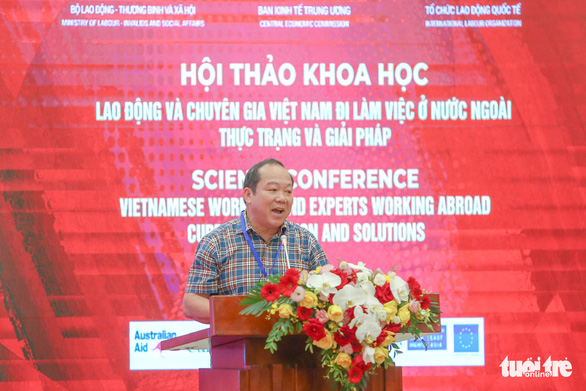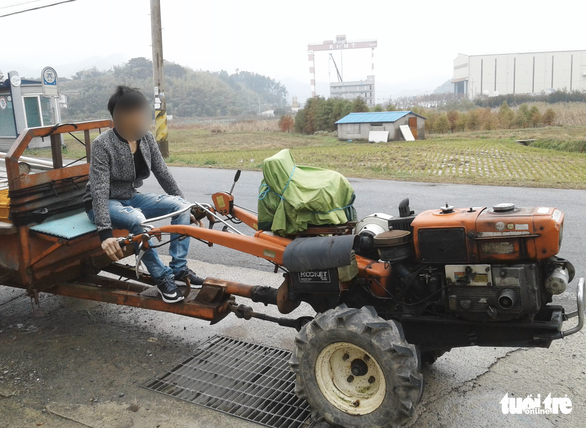South Korean authorities continue to reject work visa applications from residents of two districts in Thanh Hoa Province, north-central Vietnam, due to rampant visa overstays, according to a statement made at a conference in Hanoi.
Workers from Hoang Hoa and Dong Son Districts in Thanh Hoa Province will likely continue to have their South Korean work visas rejected, said Le Dinh Tung, deputy director of the provincial Department of Labor, Invalids and Social Affairs at the conference on Vietnamese workers and experts working abroad held in the capital city on Tuesday.
The event was jointly organized by the Central Economic Commission, the Ministry of Labor, Invalids and Social Affairs, and the International Labor Organization (ILO) Office in Vietnam.
As these districts are home to a number of workers who have continued living in South Korea despite their labor contracts having expired, South Korean authorities have suspended accepting workers from these locales until further notice, Tung told the conference.
Last month, the labor ministry forbade workers from Hoang Hoa and Dong Son Districts, along with workers from six other locales in Hai Duong, Ha Tinh, and Nghe An Provinces, from travelling to South Korea for work.
The suspension has been imposed by South Korea on Vietnamese localities that have an overstaying worker rate of 27 percent or higher, or have 70 workers or more living unlawfully in South Korea, according to the ministry.
Previously, workers from four other localities in Thanh Hoa Province, including Thanh Hoa City and Trieu Son, Thieu Hoa, and Nga Son Districts, had been rejected by South Korea for the same reasons, Tung said.
The suspension is based on regulations included in the Memorandum of Understanding on Employment Permit System (EPS) signed between Vietnam and South Korea in 2008, under which South Korea agreed to receive migrant workers from the Southeast Asian country.
 |
| Le Dinh Tung, deputy director of the Thanh Hoa Province Department of Labor, Invalids and Social Affairs, speaks at a conference on Vietnamese guest workers in Hanoi on August 16, 2022. Photo: Ha Quan / Tuoi Tre |
It is also based on the targets and road map endorsed by both sides for reducing the number of Vietnamese workers illegally working in South Korea during the 2020-22 period, the ministry said.
A possible suspension of recruitment under the EPS for 2023 will be based on the rate and number of local workers illegally residing in South Korea at the end of this year, Tung added.
According to Tung, the number of Vietnamese overstaying their South Korean work visas undermines the image of Vietnamese guest workers in the Northeastern Asian country.
Since the income of a worker in foreign countries, including South Korea, is higher than that of those who do the same job in Vietnam by seven to ten times, many Vietnamese guest workers overstay their visas in order to enjoy the higher incomes, Tung explained.
In addition, many Vietnamese workers in South Korea quit their contract jobs to illegally find new employment with higher pay, neglecting both Vietnamese and South Korean regulations.
Currently, with more than 32,000 working overseas, Thanh Hoa Province is among the Vietnamese localities leading the country in terms of workers currently working in foreign countries.
The majority of these workers work in South Korea, Japan, Taiwan, and the Middle East.
Their individual remittances range from approximately US$120 to 150 million per year.
“Thanks to such remittances, many poor households with family members working abroad are able to escape poverty and gradually build their finances,” Tung explained.
By June 30, 2022, among the more than 6,000 workers from Thanh Hoa currently working in South Korea, 890 had overstayed their visas, accounting to 8.77 percent of Vietnam’s total number of workers residing illicitly in this Northeast Asian country, the Center of Overseas Labor under the Vietnamese labor ministry reported.
In order to ease the problem, Thanh Hoa authorities said they will conduct relevant campaigns and monitoring activities, as well as strictly punish Vietnamese guest workers in South Korea who overstay their visas or illegally abandon their contracts.
Authorities will also regularly inspect job placement centers and sanction those that fail to protect the legitimate rights and interests of Vietnamese sent to work overseas.
The provincial administration will also propose that the central government set up a mechanism for supporting guest Vietnamese workers and encouraging them to return home upon their contract expiry date.
In a related recent development, the Vietnamese government on July 8 this year issued a resolution to officially adopt a policy that has been piloted since 2020, under which Vietnamese guest workers in South Korea under the EPS must pay a deposit of VND100 million ($4,290) and are offered an unsecured loan to pay the deposit.
Under the policy, the Vietnam Bank for Social Policies will negotiate with such guest worker candidates on the loan terms, repayment of principal, and loan interest rates.
Like us on Facebook or follow us on Twitter to get the latest news about Vietnam!




















































